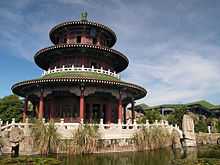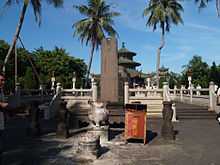Hai Rui
| Hai Rui | |||||||||
| Chinese | 海瑞 | ||||||||
|---|---|---|---|---|---|---|---|---|---|
| |||||||||
| Hai Rui | |
|---|---|
 | |
| Born |
January 23, 1514 Qiongshan, Hainan, China |
| Died |
November 13, 1587 (aged 74) Nanjing, Jiangsu, China |
Resting place | Haikou, Hainan, China |
| Nationality | Chinese |
| Occupation | Government official |
Hai Rui (Hai Jui; 23 January 1514 – 13 November 1587) was a Chinese official of the Ming Dynasty. In China he is remembered as a model of honesty and integrity in office. A play based on his career, Hai Rui Dismissed from Office, gained political significance in the 1960s during the Cultural Revolution.
Biography

Hai Rui, was born in Qiongshan, Hainan on January 23, 1513. His father died when he was three, and he was raised by his mother.[1] His great-great-grandfather was a native of Guangzhou named Hai Da-er (海答兒, Haidar, an Arabic name), and his mother was also from a Muslim (Hui) family. Hai Rui himself however was noted primarily as a Neo-Confucian and never discussed Islam in his Confucian works.[2][3]
Hai took the official examinations but was unsuccessful, and his official career only began in 1553, when he was 39, with a humble position as clerk of education in Fujian. He gained a reputation for his uncompromising adherence to upright morality, scrupulous honesty, poverty, and fairness. This won him widespread popular support but made him many enemies in the bureaucracy. Nevertheless, he was called to the capital Beijing and promoted to the junior position of secretary of ministry of Revenue. In 1565, he submitted a memorial strongly criticizing the Jiajing Emperor for the neglect of his duties and bringing disaster to the country,[4] for which he was sentenced to death in 1566. He was released after the Emperor died in early 1567.[1]
Hai Rui was reappointed under the Longqing Emperor but soon forced to resign in 1570 after complaints were made over his overzealous handling of land-tenure issues. He then spent 15 years in retirement in Hainan before being finally brought back to the Empire's "auxiliary capital" of Nanjing, in 1585, to serve under the Wanli Emperor. Hai Rui was promoted to censor-in-chief of Nanjing in 1586, but died in office a year later.[1]
Legacy


In 1959, writer and scholar Wu Han became interested in the life of Hai Rui, and wrote several articles on his life and his fearless criticism of the emperor. He then wrote a play for Peking Opera titled "Hai Rui Dismissed from Office", which he revised several times before the final version of 1961.[1] Wu's play was interpreted by the Gang of Four member Yao Wenyuan as an allegorical work, in which the honest moral official Hai Rui representing the disgraced communist marshal Peng Dehuai, who was purged by Mao after criticizing the Great Leap Forward. According to Yao, the corrupt emperor in Wu's play represented Mao Zedong. The November 10, 1965, an article in a prominent Shanghai newspaper, "A Criticism of the Historical Drama 'Hai Rui Dismissed From Office'" (评新编历史剧《海瑞罢官》), written by Yao, began a propaganda campaign that eventually led to the Cultural Revolution. During the Cultural Revolution the grave of Hai Rui was destroyed, but it has since been rebuilt.[5] Yao's campaign led to the persecution and death of Wu Han, as well as others involved in related works, such as Zhou Xinfang for his opera Hai Rui Submits His Memorial (海瑞上疏).[6]
Haikou, the largest city on Hai Rui's home island of Hainan, celebrates Hai Rui's deeds. A memorial has been constructed and his tomb is open for worship.
References
| Wikimedia Commons has media related to Hai Rui. |
- ↑ 1.0 1.1 1.2 1.3 Goodrich, L. Carrington, and Chaoying Fang, ed. (1976). Dictionary of Ming Biography, 1368-1644, Volume 1. Columbia University Press. pp. 474–479. ISBN 978-0231038331.
- ↑ by Jonathan Unger, ed. (1997). Using the Past to Serve the Present: Historiography and Politics in Contemporary China. M.E. Sharpe. p. 99. ASIN B00FAWPDUU.
- ↑ Tan Ta Sen (2009). Cheng Ho and Islam in Southeast Asia. Institute of Southeast Asian Studies. p. 114. ISBN 978-9812308375.
- ↑ Frederick W. Mote page= (2003). Imperial China 900-1800. Harvard University Press. ISBN 978-0674012127.
- ↑ Roderick MacFarquhar, The Red Terror: Mao's Last Revolution (Cambridge: Harvard University, 2006) p. 120.
- ↑ Rudolf G. Wagner (1997). by Jonathan Unger, ed. Using the Past to Serve the Present: Historiography and Politics in Contemporary China. M.E. Sharpe. p. 46- 102. ASIN B00FAWPDUU.
External links
|